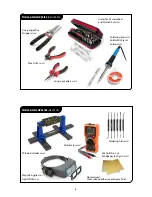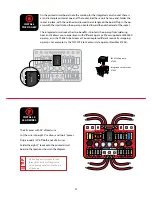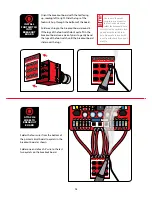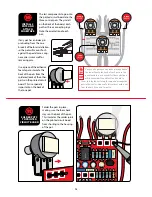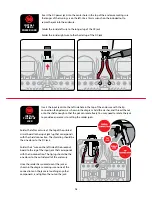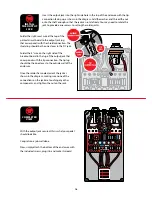
5
the one painted closest to a lead wire. When a gold
or silver band is present, it’s always one of the last
colors in the code. If you’re having trouble reading
the color bands, try using a multimeter to read the
resistor’s value. Just set your multimeter to ohms and
connect its test leads to each side of the resistor.
A number of different components are used to make
an effects pedal. Here is a look at the components
used in this kit:
RESISTORS
A resistor does exactly what it says—it resists the
flow of current. The designated value of the resistor
corresponds to how much resistance there is on the
flow of electrons.
A resistor’s value—the amount of resistance it
creates—is rated in ohms (Ω). Larger ohm values
mean more resistance. For example, a 100Ω
resistor creates ten times as much resistance
as a 10Ω resistor.
Resistor values are indicated by color bands, read
from left to right. The first color in the code is usually
UNDERSTANDING ELECTRONIC
COMPONENTS
Band 1
Band 2
Band 3
Band 4 Band 5
1st Digit 2nd Digit
3rd Digit
Multiplier Tolerance
6
8
x100
+/- 1%
68K
+/- 1%
K = 1,000
Blue
Read this band first (closest to an end)
Gray
Black
Red
Brown
BLACK 0 0 0
1
BROWN 1
1 1
10
+/- 1%
RED 2 2 2
100
+/- 2%
ORANGE
3
3
3
1,000
YELLOW
4
4
4
10,000
GREEN
5
5
5
100,000 +/- .5%
BLUE
6
6
6
1,000,000 +/- .25%
VIOLET
7
7
7
10M
+/- .1%
GRAY
8
8
8
.01
SILVER
WHITE
9
9
9
.1
GOLD
0
SOLDERING
MORE HELPFUL
SOLDERING TIPS
AND TRICKS
•
Keep your soldering tip
clean by wiping it often
on a damp sponge.
•
Also keep it tinned by
occasionally melting
a little solder onto it.
•
Don’t blow on the
hot solder or touch
anything until the joint
has cooled completely.
A good solder joint
is shiny—a sign that
it was left to cool
undisturbed.
•
Plan so each joint is
only soldered once.
Resoldered joints are
messy and more likely
to fail.
The solder joints you’ll make on the printed circuit
board are very small, and too much heat can damage
the board. The idea is to make joints quickly, without
scorching the eyelets.
1.
Hold components in place for soldering by
threading the leads through the board and bending
them apart on the reverse side. You will be making
your solder joints on the reverse side of the board.
2.
Melt a small amount of
solder onto the tip of
the iron (“tinning” the iron).
3.
Insert the tip into the eyelet and let it heat for 4-5
seconds before touching it with solder. This heats the
contact enough for the solder to flow nicely without
damage. Feed the solder to the eyelet, not the iron,
and you don’t need much solder, just enough to fill
the eyelet. Keep the iron on the connection for a
second longer; this pause gives time for all of the flux
to cook out of the joint. After the joint has cooled,
trim away the excess lead wire.


